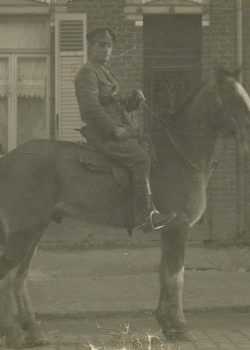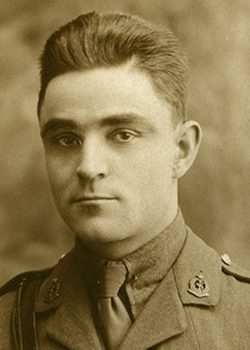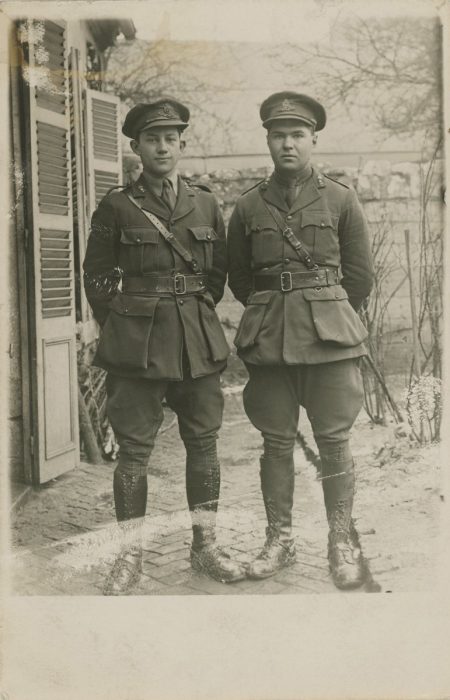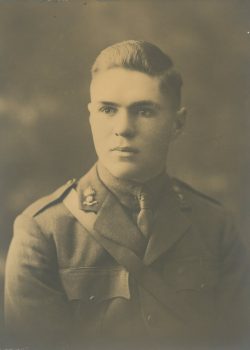![Frank Baragar (left) with his brothers Frederick [BA/1914] and Charles [BA/1910, MD/1914] in 1918. All three brothers enlisted and survived the First World War.](https://news.umanitoba.ca/wp-content/uploads/2018/11/Baragar_WEB-FEATURE-1200x800.jpg)
Frank Baragar (left) with his brothers Frederick [BA/1914] and Charles [BA/1910, MD/1914] in 1918. All three brothers enlisted and survived the First World War. // Image from Archives & Special Collections
‘Won’t peace be wonderful?’: saluting our WWI alumni
Revisiting a story that originally ran on UM Today on Nov. 6, 2018:
This week, exactly a century ago, marked the beginning of the end of the First World War.
Germany had known since August that they were fighting a losing battle: their spring offensive had failed disastrously and in the months that followed, they beat a disorderly retreat as the Allies slowly pushed them out of France and Belgium.
When the guns finally fell quiet over Europe on Nov. 11, 1918, 140 of the 1,119 enlisted graduates and undergraduates from the U of M had lost their lives.
With the 100th anniversary of Armistice, we’re reflecting on some of our alumni who served in the First World War and lived to become influential Manitobans.
FREDERICK BARAGAR [BA/1914]
Baragar served in the Canadian Field Artillery, progressing up the ranks from Driver and Gunner to Bombardier and Corporal, becoming Lieutenant of the 4th Battery in 1918. He fought at the Somme, Vimy, and Hill 70, receiving the the Military Cross for his services.

Frederick Baragar. // Image from Archives & Special Collections
Following his service, Baragar had a lengthy teaching career: first at St. John’s Technical High School, then as principal of Principal Sparling School and Laura Secord School until his retirement in 1957. In 1965, the Fred Baragar Memorial Library, an expansion of the Laura Second School library, was opened in his honour. He died on October 4th, 1964, aged 73.
In 2008, Baragar’s three children donated his war correspondence to the University of Manitoba Archives & Special Collections. Fred’s prolific letters to his fiancé and family during the war can be found on the blog From the Somewhere, including this excerpt from October 14, 1916 during his time in Pozières, France:
“We are seeing a good deal, part of which we’ll want to remember, part we’ll scarcely be able to forget. But luck is still with us … Won’t peace be wonderful? You don’t need to be proud of my work – just forgive me those things in which I’m unworthy – and love me when I return.”
CHARLES BARAGAR [BA/1910, MD/1914]

Charles Baragar. // Image from Archives & Special Collections.
Baragar went overseas with the 27th Battalion and later transferred to the Canadian Army Medical Corps to work at military hospitals in England and northern France. He was promoted to Captain and recognized for valuable service by the Secretary of State of War.
After the war, he studied psychiatry in London before being appointed Medical Superintendent of the Manitoba Hospital for Mental Diseases in Brandon in 1919. During his tenure, the facility became a well-equipped, modern hospital with the founding of a training school for psychiatric nurses, pathology laboratory, x-ray machine, and an acute psychopathic hospital. He died of pneumonia in Edmonton on March 8, 1936, aged 51.
A collection of photos taken by Charles during the war can be viewed online through UM Digital Collections.
BRUCE CHOWN [MD/1922]

Bruce Chown (left) with fellow U of M alumnus, Edward Pitblado, in Belgium, 1916. // Image from Archives & Special Collections
Chown served in the Royal Canadian Artillery and was a Lieutenant in the 38th Battalion, receiving the Military Cross for his services.
In 1944, he established the Winnipeg Rh Laboratory where documented infants affected by erythoblastosis fetalis (Rh disease). His early research on Rh blood grouping methods and treatment protocols, combined with later studies Chown undertook with colleagues Alvin Zipursky and John M. Bowman, eventually led to the ground breaking development of an Rh disease vaccine in 1968. The Rh Immune globulin vaccine almost completely eradicated the disease, saving the lives of thousands of babies around the world.
He received many accolades for his scientific contributions, including being awarded an honorary degree by the U of M in 1963, being made an Officer of the Order of Canada in 1967, and receiving the Queen Elizabeth II Silver Jubilee Medal in 1977. Chown died on July 3, 1986, aged 93.
EDWARD PITBLADO [BA/1920, LLB/1926]

Edward Pitblado in 1915. // Image from Archives & Special Collections
Pitblado served in the Royal Flying Corps and was a Lieutenant in the 37th Battalion. He returned to military service in the Second World War with the Royal Canadian Air Force. In 1922, he was selected as the of University of Manitoba’s Rhodes Scholar and, while in Oxford, competed in the 1924 Winter Olympics on the British ice hockey team. He is noted for scoring a hat-trick in Great Britain’s first match of the Olympics against France.
Pitblado would go on to have a long, distinguished legal career in Winnipeg (he and his father’s former firm still carries their name: Pitblado LLP). He was instrumental in the founding of Ducks Unlimited Canada, and was inducted into the Manitoba Order of the Buffalo Hunt in 1973 for his contributions to wildlife. He died in Winnipeg on December 2, 1977, aged 81.
In the early 1980s, the Pitblado family donated materials from Edward’s wartime experience to the University of Manitoba Archives & Special Collections, including his letters home from Europe during the First World War. Digitized copies of his war diaries can be viewed online, including this excerpt from October 15, 1916:
“7:45 p.m. terrific bombardment starts, and I am trembling like a leaf, as it is so, exciting, and the whole place just throbs … Wonder what will develop tomorrow. Gee but its (sic) good to be on this side of the wire, and know that we at least stand a chance of living a few hours … The poor old candle blinks at every bang, as if to say “Go to it, I take off my hat to each and every shell”.”
A memorial Roll of Honour, listing all U of M alumni who served in the First World War, can be viewed online.
Do you have a story of an alumus who served in the First World War? Let us know in the comments.






